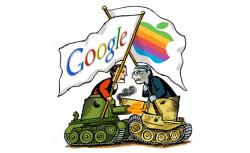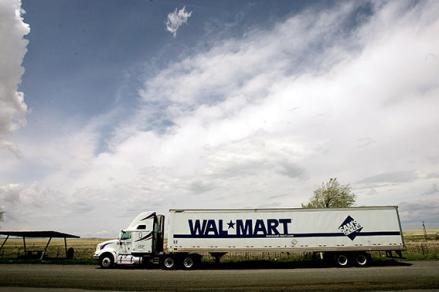From the beginning, the spat between Google and Apple has captivated Silicon Valley and the New York media. But the boys down in Bentonville, Ark., haven’t paid it much mind. When Jim Walton read that Google had delisted Apple from its search results, he chuckled and shook his head. “You see this, Rob?” he called out over a bowl of grits. “Naw,” his brother replied, a little impatiently. He had bigger things to worry about.
But as the conflict escalated, the brain trust of America’s largest company had no choice but to take notice. And when word comes, in the midst of an emergency Wal-Mart board meeting, that those turtlenecked loons in the Apple Army have managed to assassinate the president and vice president, Rob Walton pounds his fist. “That’s it,” he shouts, and picks up the phone.
In corporate rivalries, a lot of factors come into play: market position, strategic alliances, distribution channels, talent, access to information. But in a land war, only four things really matter: manpower, weaponry, territory, and supply lines. Google has 45,000 employees, a few office buildings, and a handful of Priuses programmed to obey the speed limit. Apple has 80,000 employees, a few hundred retail stores, and, apparently, a cute little firearm called the iPistol. Somehow these two Silicon Valley upstarts have managed to delude themselves that their dominance in the digital realm means they can act with impunity in the real world too. They’re about to learn the true value of brick and mortar and boots on the ground.
Wal-Mart, the world’s largest private employer, has some 2.2 million workers at its disposal—a sprawling force outnumbering that of the entire active-duty U.S. military. Rob Walton’s orders are carried out quickly via the world’s most advanced logistics system. At 4,000 Wal-Mart locations around the country, associates trade in their price guns for real guns. iPistol, schmiPistol—Wal-Mart is the nation’s largest seller of firearms.
Its employees aren’t exactly eager to lay down their lives for a $9-per-hour wage, but the bosses are promising they’ll finally pay overtime, and they have families to feed. Besides, they’re assured that there will be little resistance. Piling into semi trucks, they storm the data centers first. A few brave shorts-clad engineers make the mistake of strapping themselves to their servers; the rest promptly surrender and are spared. Now with the tacit support of congressional Republicans, the Wal-Mart foot soldiers fan out across the town halls, statehouses, and military bases of the American heartland.

Illustration by Robert Neubecker
They are the shock troops in the great populist militia, but they are hardly alone. When Walton picked up that phone, he started by dialing his operations officers, but then he turned to his other Rolodex—the one with the private lines to his golf buddies, fellow country-club members, and his almost-peers on the Fortune 500. His board members did the same, and before long virtually the entire power structure of the American South is in agreement: The rebellion has to be quashed, and both Google and Apple vanquished.
One board member in particular—Wake Forest business school dean Steven Reinemund—will later be hailed as a hero for bringing his friends and former associates at ExxonMobil, the nation’s second-largest company, into what comes to be known as the Southern Alliance. In the aftermath, the editorial boards of the New York Times and the Economist will reflect that a regional power shift like this was inevitable. The South, after all, has long been the country’s most populous and economically dynamic region. Truth be told, though, the populist counter-revolution stretches from coast to coast, with fellow Wal-Mart board members Marissa Mayer and Gregory Penner marshaling their own formidable tech-world connections in Silicon Valley and New York.
Within 24 hours Al Gore is in prison, the Apple fanboys have retreated to their online comment boards, and Larry Page has been exiled to his own private beta-test country. All that’s left is some infighting among the Alliance, where a push to install John Boehner as president is overruled by cooler heads. In the name of bipartisan reconciliation, the Oval Office goes instead to former Wal-Mart board member Hillary Clinton. Bing becomes the world’s default search engine, Amazon and Facebook shareholders rejoice, and peace is restored to the land.
Somewhere in Bel Air, Elon Musk has a devious gleam in his eye …
